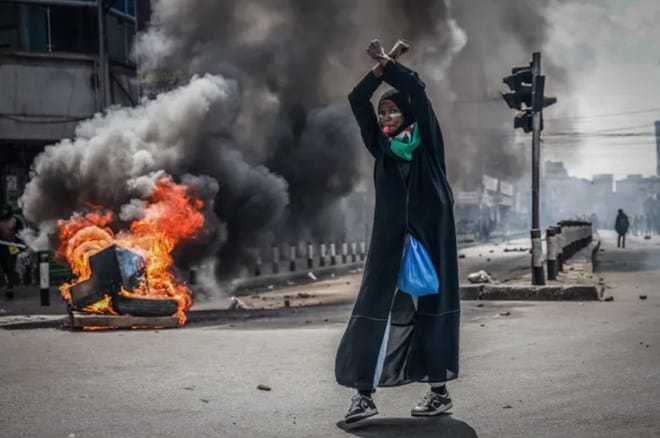At least sixteen people lost their lives during Wednesday’s anti-government demonstrations across Kenya, with the majority reportedly shot by police officers, according to Amnesty International Kenya and the Kenya National Commission on Human Rights (KNCHR).
The protests marked the one-year anniversary of the deadly 2024 anti-tax demonstrations that ended in the storming of parliament. Thousands of demonstrators took to the streets of Nairobi and other cities, demanding justice for those who died last year and protesting against alleged police brutality and continued economic hardship.
In Nairobi, the situation escalated quickly as security forces responded with tear gas, water cannons, and—according to human rights groups—live ammunition. “We have confirmed sixteen deaths by 8:30 PM,” said Irungu Houghton, Executive Director of Amnesty Kenya. “Most of the victims were killed by police gunfire.”
The government-funded KNCHR earlier reported eight confirmed deaths from gunshot wounds, along with more than 400 injuries. These included protesters, police officers, and members of the press. Kenya’s Independent Policing Oversight Authority (IPOA) also confirmed the arrest of 61 individuals during the protests.
Hospitals in Nairobi were overwhelmed. Kenyatta National Hospital received at least 107 injured individuals, most of them with gunshot wounds, a medical official said.
Amid the chaos, Kenya Power reported that one of its security guards was shot dead while on patrol at the company’s headquarters in the capital.
The protests reached near State House, the president’s residence, as live broadcasts showed large crowds clashing with police. Two local TV stations, NTV and KTN, were taken off-air after defying a government order to stop live coverage, though a Nairobi court later suspended the directive, allowing them to resume broadcasts.
Smaller protests were also reported in Mombasa, Kisii, Kitengela, Nyeri, and Matuu, pointing to a nationwide expression of frustration.
Mounting Tensions Over Police Conduct
Public anger against law enforcement has been mounting, not only due to the excessive use of force but also because of a recent case that has struck a nerve: the death of 31-year-old blogger and teacher Albert Ojwang while in police custody.
On Tuesday, six people—three of them police officers—were formally charged with his murder. All have pleaded not guilty. Ojwang’s death has become symbolic of the long-standing grievances many Kenyans hold regarding extrajudicial killings and forced disappearances.
“We’re protesting for those who died on June 25, for Albert Ojwang, and for every youth denied justice,” said Lumumba Harmony, a demonstrator in downtown Nairobi.
Last year’s events were described as the most serious crisis of President William Ruto’s administration. The use of deadly force against peaceful demonstrators in 2024 drew sharp criticism from international partners and rights organizations. This year’s commemorative protests, despite government assurances of restraint, seem to confirm that the issues of accountability and police conduct remain unresolved.
As of now, there has been no official response from the Kenyan police spokesperson regarding the deaths or injuries reported during the June 25 anniversary demonstrations.



